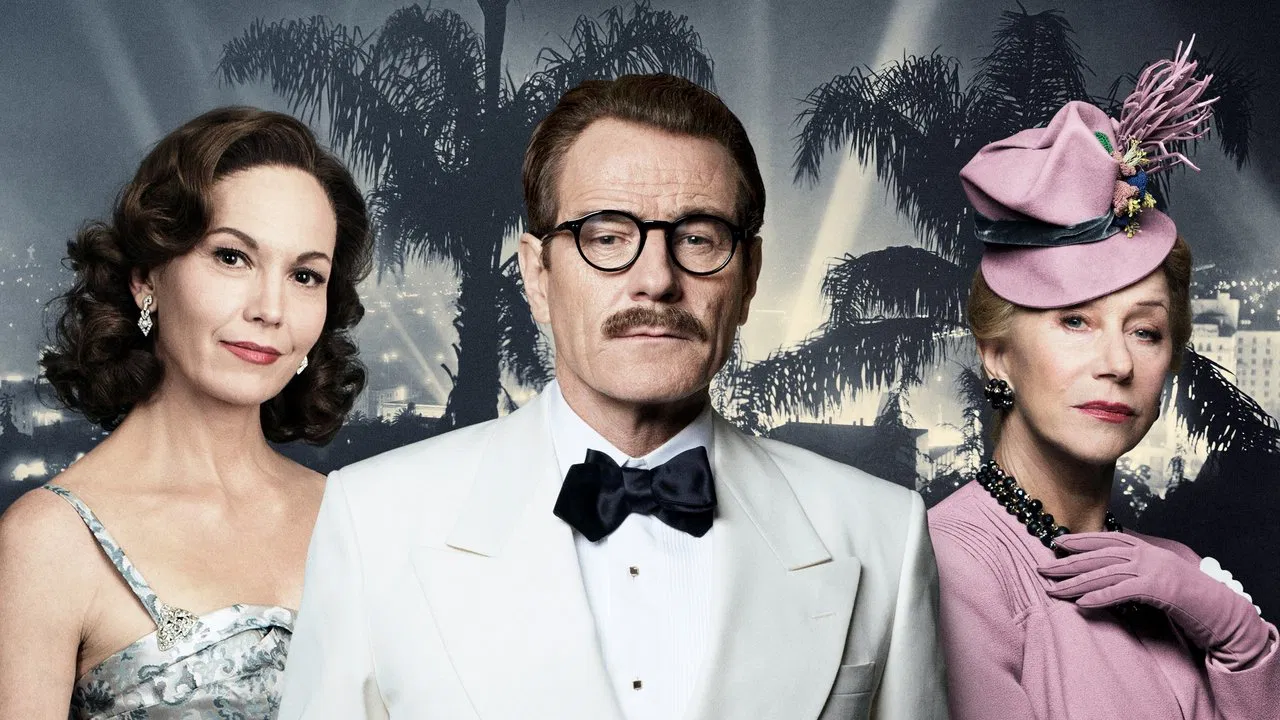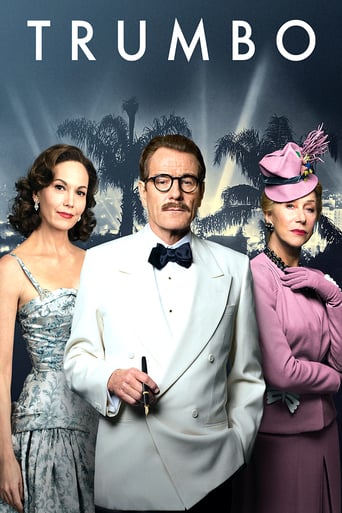

Cranston is a magnetic on screen presence and Mirren is surprisingly vile, great of course, but truly vile. I'd wondered why I'd not heard of this fellow. That he wrote most of his best stuff (including Spartacus) under pseudonyms having being pushed out of Hollywood due to his politics explains a lot. It's not all dark though, in fact it's all delivered quite pleasantly, with plenty of humour. Not least with Trumbo squaring up defiantly against the John Wayne character in a particularly amusing scene. I've no idea what The Duke was like in real life, but here he's painted a little bit like Charlton Heston, a gun toting good ol boy. It's a scene of brain against brawn, intelligence verses paranoia. It may be a slightly bleak story, but blimey if it's not great!
... View MoreTowards the end of the film, Dalton Trumbo (Bryan Cranston in an Academy Award-nominated performance) makes a profound statement during his acceptance speech for the Laurel Award for Screen Writing Achievement during a Writer's Guild of America ceremony (1970). He says (paraphrase) "It will do no good to search for villains or heroes or saints or devils because there were none; there were only victims (during the communist blacklist years of the 1940's and 1950's)." This part of his speech sums up well the point of this film which chronicles one of the few survivors of the communist blacklist scare during the two decades after the Second World War. Not only teachers, doctors, academics, factory workers, social workers and many others were targeted resulting in the devastation of careers and lives, but also people working in the entertainment industry in Hollywood, CA. Few congressional committees in Post-World War Two United States were more un-American than the House Un-American Activities Committee and the Senate Subcommittee on Internal Security. The latter saw the rise of Sen. Joseph McCarthy's witch-hunts in which he accused people both within the US government and without but among the US citizenry as being communists in collusion with the then Soviet Union (USSR). As a result of these witch-hunts, friends turned on friends, usually fearing the wrath of the committee. If you didn't cooperate, the "scarlet letter" of communist or communist sympathizer was forever plastered onto you like a badge of shame. In addition, you might spend time in prison for being in contempt of congress. In the case of Dalton Trumbo, he experienced both indignities. Dalton Trumbo was one of the most brilliant screenwriters of his era. He wrote such classics as "A Guy Name Joe", "Thirty Seconds Over Tokyo", "Roman Holiday", and even the b-film noire "Gun Crazy". He also wrote the screenplays to two great Hollywood epics: "Spartacus" and "Exodus". Despite his credentials, he was subpoenaed by the House Un-American Activities Committee to testify about whether he was or had been a member of the Communist Party. Many of his Hollywood friends were also subpoenaed, some were sympathetic to the cause of rooting out "communists" while others who were appalled at the committees' actions but terrified of being blacklisted reluctantly cooperated. Prominent members of the entertainment community including Edward G. Robinson, John Wayne, and Ronald Reagan were brought before the committee. Trumbo was no exception. Will he cooperate or risk losing his career?A brilliant film with a tour-de-force performance by Cranston as Trumbo. Trumbo is not always the easiest of characters to like. He sometimes sacrifices the needs of his family to maintain his career. Cranston finds the difficult balance of finding the humanity of Trumbo while also exposing his many shortcomings, including writing in the bathtub! Trumbo was a brilliant writer who didn't deserve his treatment at the hands of the US government. At the same time, his family didn't deserve what they suffered either. As stated earlier, there were no victors but only victims.
... View MoreAll movie fans should recognize the name of Dalton Trumbo. Even if his heyday was a good half-century ago, his actions during one of Hollywood's very darkest periods still have tremendous impact even today. Especially today, for that matter.Some quick background. You may recall that in World War II, the US and the Soviets were allies but that after the war we became distrustful adversaries. This time was known as the Cold War – since the two countries didn't fight one another – and really ended only in the late 1980s. Prior to the end of WW II, many Americans joined the Communist Party as a way to fight the rise of Fascism in Europe. After the war, current and former members of the Party were looked upon as pariahs of the highest order. Screenwriter Dalton Trumbo (Bryan Cranston) was one of these pariahs. It didn't help that he actively tried to rally technical workers on film sets (grips, lighting and sound technicians) to strike for higher pay. Unionizing was seen as a bad thing, despite the gains it had achieved for American workers earlier in the century.Trumbo's membership in the Party wasn't a big deal at first, but then gossip columnist Hedda Hopper (Helen Mirren), who wielded an enormous amount of power in Hollywood, took it as a personal affront and used her column (and weekly appearance in newsreels) to denounce Communism in general and Trumbo in particular. Kicking the whole scandal into high gear was a little-known congressional group – the House Un-American Activities Committee. These guys tried to rout out Commies from Hollywood (which it saw as holding a lot of sway over Americans, much more so than today) by calling a group of known or suspected Communists to Washington for sworn testimony. These men were known as the Hollywood Ten. Trumbo was one of them, and he refused to tell the committee the names of anyone else who was or who could be a Communist. He, like his fellow Ten members, was found in contempt. Later, someone not in the group did name Trumbo, and he was put in prison for a full year.When he got out, no one would hire him (or any of the others in the Ten). Except for King Brothers Studio, which couldn't pay him much. But Trumbo worked fast as both a writer of original stuff and a fixer of existing scripts. The Kings loved him. So much so that the others in the Ten were offered jobs (for no credit, same as Trumbo) working as script doctors. During this time, Trumbo also got work from some friendly sorts in the business by selling them a script but not taking on-screen credit; the credit typically went to a fictitious person, or to a willing accomplice – known as a front. Through this method, Trumbo won two writing Oscars – although no one knew it at the time.Dalton Trumbo fought for himself, his fellow writers, and for anyone for whom the Bill of Rights holds any meaning. He reasoned that if people could be silenced for political beliefs, then anyone could be silenced for any reason. This is, unfortunately, still true today. And although he didn't receive credit at the time, Trumbo was awarded his Oscars eventually (one posthumously). He's recognized as being one of the very greatest screenwriters the world has ever known. The movie does a terrific job describing Trumbo's struggles – and that of his family: his wife Cleo (Diane Lane) and his three doting children. The toll that his stance took on them was noticeable to everyone except for Trumbo himself.Cranston turns in what was an Oscar-nominated performance, but his was not the only one of note. Lane is superb as his suffering, strong better half. Elle Fanning, as his eldest daughter, is also a standout, as are John Goodman (as Frank King) and Alan Tudyk (as writer Ian McLellan Hunter). Spellbinding from start to finish, and all screenwriters owe Trumbo a huge debt of gratitude for his long struggle on their behalf.
... View MoreWhat shocked me most is the mirror reflection of today's Russia (or "Russia Today":) - that's the place where I live. This whole story and characters are literally taken from the Moscow streets. Especially streets that are filled with crowds today. You can't stay quiet. You are not allowed to express yourself either. You just have to pick up which side you are on. Seriously, this Movie should be banned from modern Russia screens! Yet I've seen it there only! And that means not everything is so tragically late as it seems. Neither here nor somewhere else until characters like Hero will appear from time to time. Love this Movie! The idea behind it is just fabulous! 10 out of 10!
... View More